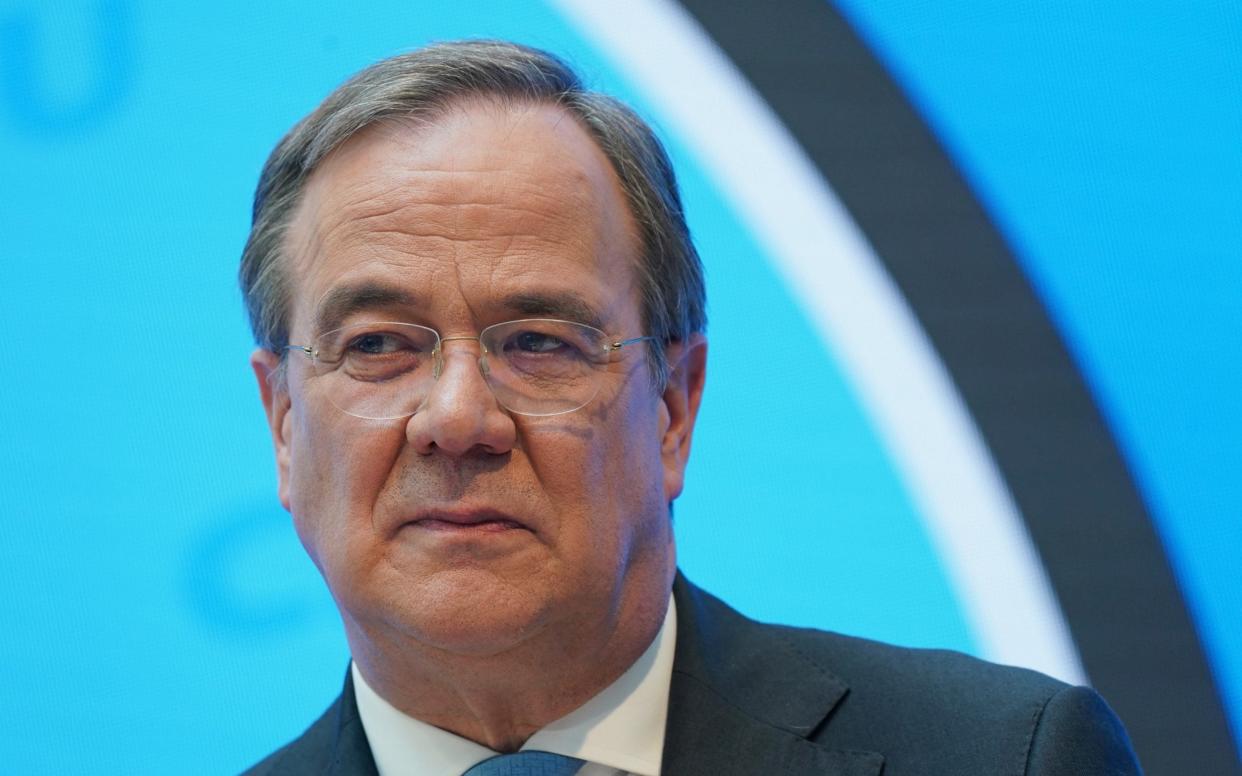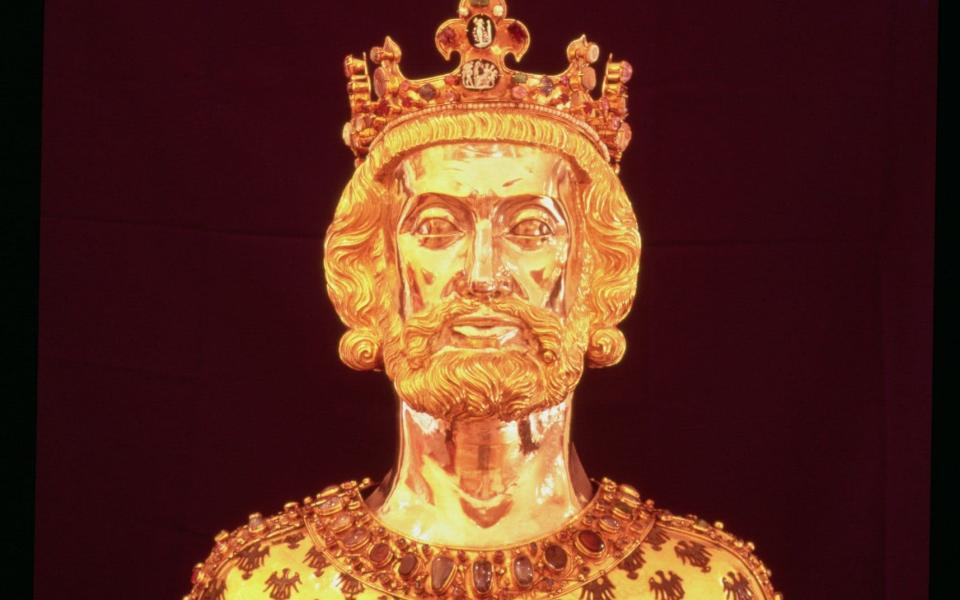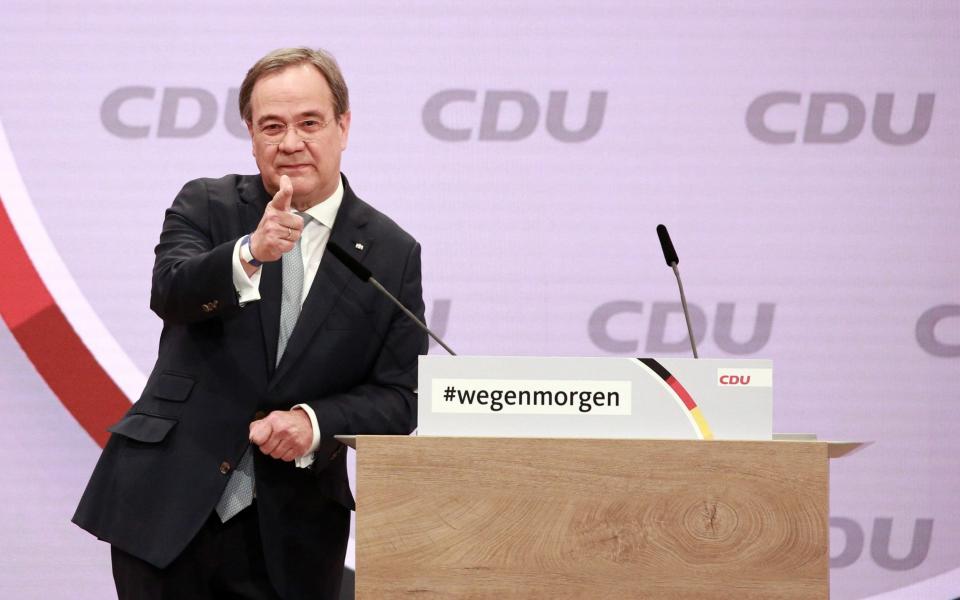Armin Laschet: Merkel's party in revolt against her chosen successor

- Oops!Something went wrong.Please try again later.
- Oops!Something went wrong.Please try again later.
Armin Laschet has not got off to the best of starts in his bid to succeed Angela Merkel as chancellor of Germany. Less than a week after he was named as the official candidate for her Christian Democrats (CDU), the party is facing a wave of desertions.
“In the next few days I will end my membership in the CDU with a heavy heart after more than 20 years,” one former supporter wrote to his MP in a letter leaked to Bild newspaper.
“I've been a loyal CDU voter for 31 years. With yesterday's nomination of Mr Laschet as candidate for chancellor, this is unfortunately history,” wrote another.
The CDU is facing fury from the grassroots over its decision to prefer Mr Laschet to the more popular Markus Söder, the Bavarian regional leader.
“The weather is ugly,” a party insider told Bild. “I've never seen anything like it before. Not in the refugee crisis or in the euro crisis.”
A poll of CDU supporters this week found that an overwhelming 77 per cent think the party has chosen the wrong candidate.
“Never has a candidate entered a general election for the CDU so torn and dishevelled,” Spiegel magazine wrote this week.

The opposition to Mr Laschet is not ideological — just three months ago he was elected party leader by a healthy margin. But unlike Mr Söder, he doesn’t poll well with the general electorate. The CDU grassroots think their party has backed a loser.
Yet this is the man who just four years ago broke Germany’s red wall for the party, leading the conservative CDU to victory in regional elections in the traditional heartland of the centre-Left Social Democrats (SPD).
He did it at a time when Mrs Merkel’s popularity was at a low in the wake of her “open-door” migrant policy, and paved the way for her to cling onto power in national elections four months later.
He will be hoping he can stage a similar comeback this time. For Mr Laschet is no stranger to low expectations.
When it emerged last year that his family likes to claim descent from Charlemagne, the 8th century emperor who ruled much of western Europe from their home city of Aachen, it prompted amusement in German political circles. For one thing Charlemagne was tall for his era at over six feet, while Mr Laschet is just 5’7”.

To be fair, it was more of a family joke than a serious claim. And like his alleged ancestor, Mr Laschet can claim to have won power.
In 2012 the CDU passed him over to lead its campaign in his native North Rhine-Westphalia, preferring the more cerebral Norbert Röttgen, who promptly led the party to defeat. The dogged Mr Laschet did not give up, five years later he got his chance and led the party to victory.
North Rhine-Westphalia is not just another German state: with a population of 18m it is larger than most European countries. Part of the secret of Mr Laschet’s success is that, far from royalty, his family is linked to the mining industry that was once the backbone of the state’s economy.
His father was a mining engineer, and when Mr Laschet brandished his old miner’s badge in the speech that won him the party leadership in January it was a telling moment. It pitched Mr Laschet as the true heir to Mrs Merkel, who could unite the CDU’s conservative and business wings with more centrist voters who only switched to the party during her leadership.

But it was a moment that feels a long time ago. Until this week there was a sense in the party that Mr Laschet was too nice, too vacillating and indecisive — a sense Mr Söder hoped to capitalise on with his bid for the chancellor candidacy.
But once again Mr Laschet has surprised everyone. There are two narratives about what happened at the talks that finally sealed the candidacy this week. One is that a wavering Mr Laschet had to be propped up by the old CDU warhorses Wolfgang Schäuble and Volker Bouffier, who made it clear to Mr Söder that their man was going to be candidate one way or another.
The other is that it was Mr Laschet who, across a table, away from the cameras, stared down Mr Söder and told him: “With you as candidate we will lose in September”.
The outcome of the election may come down to which of those is the real Mr Laschet.

